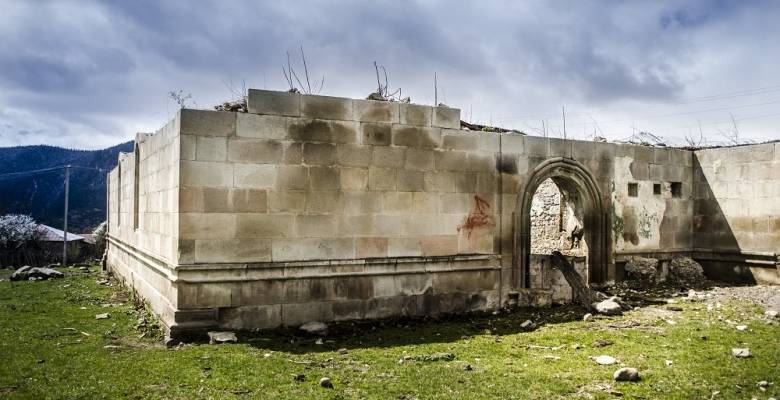საერთო ცხელი ხაზი +995 577 07 05 63


Human Rights Education and Monitoring Center (EMC) has addressed the United Nations Human Rights Committee on behalf of the local Muslims regarding the case of the Mokhe historic mosque. EMC asks the Committee to establish the violation of the relevant provisions of the UN Covenant on Civil and Political Rights due to the discriminatory restitution policy towards non-dominant religious groups.
For years, the local Muslim community has been asking for the return of the Mokhe historic building. On October 18, 2014, the local authorities started the process of demolition and cleanup. This decision of the local authorities was followed by the protests of the local Muslims, which resulted in the arrest of 14 of them. Following these events, the Patriarchate has complained regarding the religious belonging of the building, for the first time. Patriarchate relied on various versions when asserting the Christian origin of the building, however none were backed up with valid historical sources. Without a proper investigation, based on unjustified and, at the same time, controversial statements of the Patriarchate, the government considered this structure as subject to dispute. In December 2014, the State Agency for Religious Issues created a special commission to study the confessional origin of the building. However, two years later, on May 11, 2017, the Commission made a final decision, according to which it refused to study the confessional origin of the building, instead, the building was granted a disputed cultural heritage status and a new mosque was built in the village for the local Muslim community. Part of the Muslim community believes that the decision taken by the State Agency for Religious Issues is unfair and continues to pray in the open air next to the historic building.
In the complaint submitted to the UN Human Rights Committee, EMC criticizes the discriminatory legislation and policy related to the process of restitution (return of the seized buildings during the Soviet period to their historic owners). In the complaint, EMC notes ineffectiveness of the state created commission, as a dispute resolution mechanism.
State, without proper investigation, declaring the Mokhe historic building as disputed and the State Agency for Religious Affairs trying to resolve the issue through political lenses, thus bypassing legal regulations, shows the arbitrary nature of the state policy, and establishes a negative precedent for resolving similar disputes. In the complaint, EMC reviews the challenges faced by various religious organizations in terms of restitution and tries to show the Committee the systemic nature of the problem as well as its social and legal effects. The complaint points out the shortcomings of the state policy towards the Muslim community, including the problem of political instrumentalisation of the official religious organizations, which was obvious during the work of the commission in relation to the disputed Mokhe historic building, when the State Agency for Religious Issues disallowed the persons trusted by the local Muslim community to be included in the work of the commission and the community was concerned that their formal representatives involved in the work of the commission did not convey their real needs and requests.
Considering the factual circumstances of the case of the Mokhe historic building, the applicants complain before the UN Human Rights Committee under the following articles of the Covenant: Article 2, paragraphs 1 (the obligation to secure the rights recognized in the Covenant) and 3 (right to an effective remedy), Article 18 (freedom of religion), Article 26 (equality before the law) and Article 27 (minority rights, including religious minorities). It should be noted that, similarly to other local and international organizations [1], the relevant political and legal [2] mechanisms of the United Nations have on numerous occasion stated their critical position on the discriminatory nature of the restitution policy.
If the case is resolved in favor of the applicant, the State shall be given the recommendation to elaborate the restitution policy based on the principles of equality and ensure the functioning of the fair mechanisms for resolving the disputes relating to the religious buildings on the institutional level.
[1] http://www.ombudsman.ge/ge/reports/saparlamento-angarishebi
https://www.coe.int/t/dghl/monitoring/ecri/Country-by-country/Georgia/GEO-CbC-V-2016-002-ENG.pdf
https://rm.coe.int/CoERMPublicCommonSearchServices/DisplayDCTMContent?documentId=0900001680590fb5
[2] The report is available here: http://docstore.ohchr.org/SelfServices/FilesHandler.ashx?enc=6QkG1d%2FPPRiCAqhKb7yhstNBq%2BgKf4e%2FR1Jt%2FY5Toy%2BU%2FbEAk%2FX4tZ65giu9PzQqwRC7MtpShIzystTq3yLBBf%2Bix6QBHzEtA8hztY5Lzc2bkL%2Fc92pt5MWgAYP%2FSTpa
The website accessibility instruction